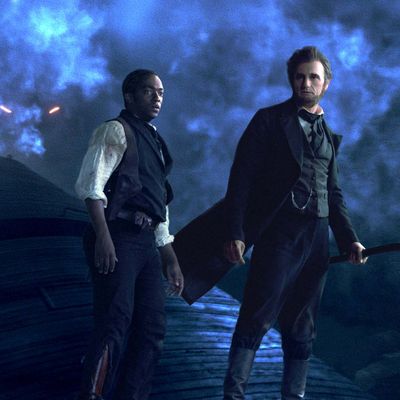
Does any other American president have such an extensive fictional pop-culture mythos? In the thirties, the hero of John Ford and Henry Fonda’s Young Mr. Lincoln fought misguided lynch mobs and fancy city lawyers with false modesty and folksy credulousness. Today, Timur Bekmambetov and Seth Grahame-Smith’s Honest Abe fights vampires with the shock and awe of Hollywood’s full CG firepower. So, maybe each generation gets the Lincoln it deserves. The fault, dear Brutus, is not in our films, but in ourselves — to paraphrase the Earl of Oxford.
If I sound like I’m taking a movie called Abraham Lincoln: Vampire Hunter a bit too seriously, that’s because the movie, directed by Bekmambetov and based on Grahame-Smith’s novel, kind of takes itself seriously. Producer Tim Burton’s name might be prominent in the credits, but his cheekiness is nowhere to be found. Bekmambetov likes his action theatrics to be consequential. In the Night Watch and Day Watch movies, nothing less than the future of the human race was at stake. The assassins in Wanted weren’t just assassins; they were an ancient race of supernatural assassins. And Vampire Hunter isn’t just a riff on the adventures a young Abe Lincoln (Benjamin Walker) might have had — it essentially turns the Civil War into a personal vendetta.
The vampires, led by dandyish, cold-eyed Adam (Rufus Sewell), are slave traders, one of which (Marton Csokas) kills young Abe’s mother after he tries to prevent them from selling his black friend Will. Using his famous ax-wielding skills and with some Morpheus-like help from good vampire Henry Sturgess (Dominic Cooper), the future president becomes a hunter of the undead. But the story actually goes up through the battle of Gettysburg, where the Army of the Potomac (a.k.a. the Union) is on the verge of being laid low by an undead corps of the Confederacy, before Lincoln rushes to the rescue.
Believe it or not, Bekmambetov’s style is somewhat restrained here. There’s still a lot of slow-motion acrobatic lunacy and bursts of gore, but he keeps some of his worst instincts — a fondness for kineticism rather than clarity, for example, that hobbled Day Watch –— in check, and we can actually follow the action occurring onscreen. He’s also always had an eye for strange moments of cinematic grandeur: small glints glimpsed in an overhead shot of a town being requisitioned for its silver; a train hurtling in the night toward a massive wooden trestle bridge in flames.
Unfortunately, there’s also a certain artificiality to the whole film, both visually and narratively. By sticking a little too much to some of the actual particulars of the Lincoln story (even Stephen Douglas shows up, as he did in Young Mr. Lincoln, acourting the future Mary Todd Lincoln), the film has the strangely programmed feel of a historical pageant, as if Raiders of the Lost Ark had been crossbred with The Longest Day. Matters aren’t helped by Benjamin Walker’s indistinct performance: With his expressionless face and his smooth, half-formed features, he resembles nothing so much as a Liam Neeson action figure. Still, there is something bracing about a film that’s not afraid to link the entire Confederacy, still an inexplicable source of pride in some parts of the country, with a race of humanity-enslaving vampires. I can’t wait to see how this thing plays in South Carolina.





